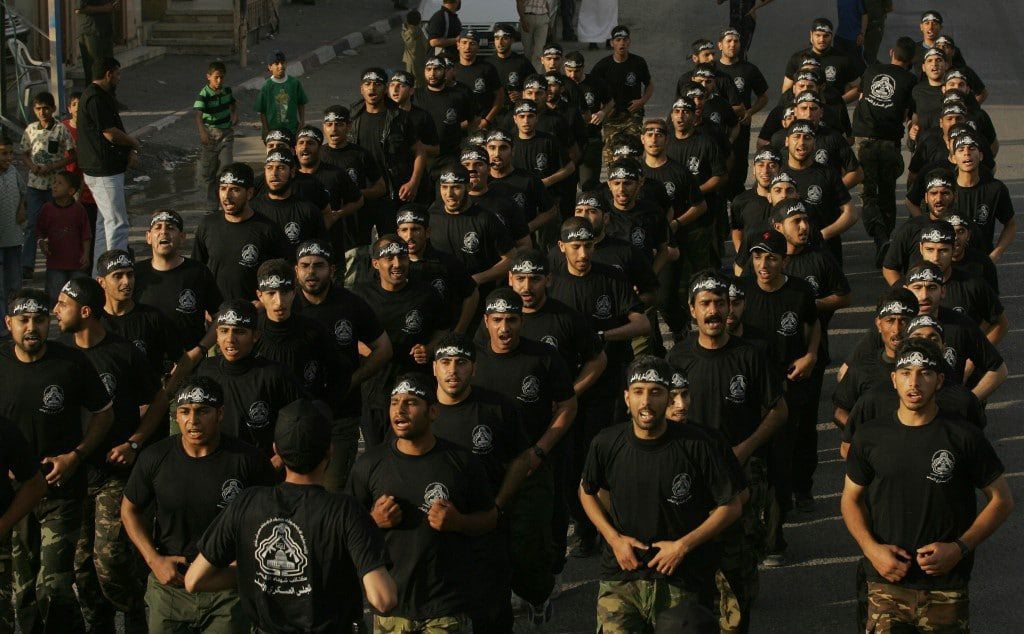Immediately after Hamas' seizure of power, Israel imposed a blockade of the Gaza Strip. No border crossings were allowed, and only goods that served humanitarian purposes (according to Israel) could pass into Gaza.

To free itself from the direct control of a large number of Palestinians and to strengthen its grip on the West Bank, the Likud government of Prime Minster Ariel Sharon decided to disengage unilaterally from the Gaza Strip in 2005. The Israeli withdrawal that followed took place in August. Two years later, Hamas seized power in Gaza in June 2007. According to the International Red Cross more than a hundred people died in the week long battle between Hamas and Fatah fighters.
Hamas, an acronym of the Islamic Resistance Movement, is considered a terrorist organization by the United States and the European Union. The group is held responsible for numerous suicide bombings in Israel, rocket attacks from Gazan soil on Israeli towns and villages, and killings of political opponents. Immediately after Hamas’ seizure of power, Israel imposed a blockade of the Gaza Strip. No border crossings were allowed, and only goods that served humanitarian purposes (according to Israel) could pass into Gaza. The economy in Gaza came to a standstill. Contraband could only reach the population by way of underground tunnels from the Egyptian border.
From the summer of 2008, a ceasefire had been in place. Hamas had promised to cease its rocket attacks and in return Israel was to lift the blockade of Gaza. Early November, Israel violated the ceasefire by launching a bloody attack. As a result, Hamas decided not to renew the ceasefire, after which homemade Qassam rockets were once again launched from Gaza into Israel.
On Saturday morning, 27 December 2008, Israeli air attacks took place on Hamas’ infrastructure in northern and central Gaza. This was the opening of what the Israeli military called Operation Cast Lead. The offensive caught Hamas off guard. According to Israeli statements, about 250 Hamas operatives were killed in the initial bombing wave, along with civilians. On 3 January 2009, after a day of aerial shelling and artillery fire on Hamas strongholds in Gaza, Israeli infantry, backed by fighter jets and helicopter gunships, entered the Strip’s north. After 22 days of battle Israeli forces withdrew from Gaza. There were thirteen Israeli casualties, three of whom civilians. Circa 1,400 Gazans died, including between 750 to 900 non-combatants.
A Fact Finding Mission set op by the UN Human Rights Council and presided over by South African Justice Richard Goldstone, reported in September (Goldstone Report) that ‘both Israeli forces and Palestinian militants committed serious war crimes and breaches of humanitarian law, which may amount to crimes against humanity’.
‘We came to the conclusion, on the basis of the facts we found, that there was strong evidence to establish that numerous serious violations of international law, both humanitarian law and human rights law, were committed by Israel during the military operations in Gaza,’ Goldstone said at the presentation of the report. ‘The mission concluded that actions amounting to war crimes and possibly, in some respects, crimes against humanity, were committed by the Israel Defense Force.’ According to the report, ‘there is no question that the firing of rockets and mortars [by armed groups from Gaza] was deliberate and calculated to cause loss of life and injury to civilians and damage to civilian structures. The mission found that these actions also amount to serious war crimes and also possibly crimes against humanity.’
Israel had refused to cooperate with the mission, whose mandate was ‘politically motivated’ and ‘one-sided’, as the Israeli Ministry of Foreign Affairs stated. ‘The mandate calls for an investigation into violations of international law by “the occupying Power, Israel, against the Palestinian people”. It does not mandate any investigation of violations by Palestinian terrorist organizations.’
In May 2010, a Turkish flotilla of six ships tried to break the blockade of Gaza. Trying to stop the flotilla, Israeli commandos boarded one of the ships in international waters off the Gaza coast. The Israeli Armed Forces made a botch of the operation and nine people on board were killed. Israel refused to set up an international commission of inquiry. Nevertheless, Prime Minister Benjamin Netanyahu promised to partly lift the blockade. In July 2010, an Israeli military commission of inquiry concluded that ‘in terms of the intelligence effort, not all possible intelligence gathering methods were fully implemented and that the coordination between Navy Intelligence and the Israel Defense Intelligence was insufficient’. Furthermore, the operation ‘relied excessively on a single course of action, albeit a probable one, while no alternative courses of action were prepared for the event of more dangerous scenarios’ (see Israel Defense Forces Blog).

